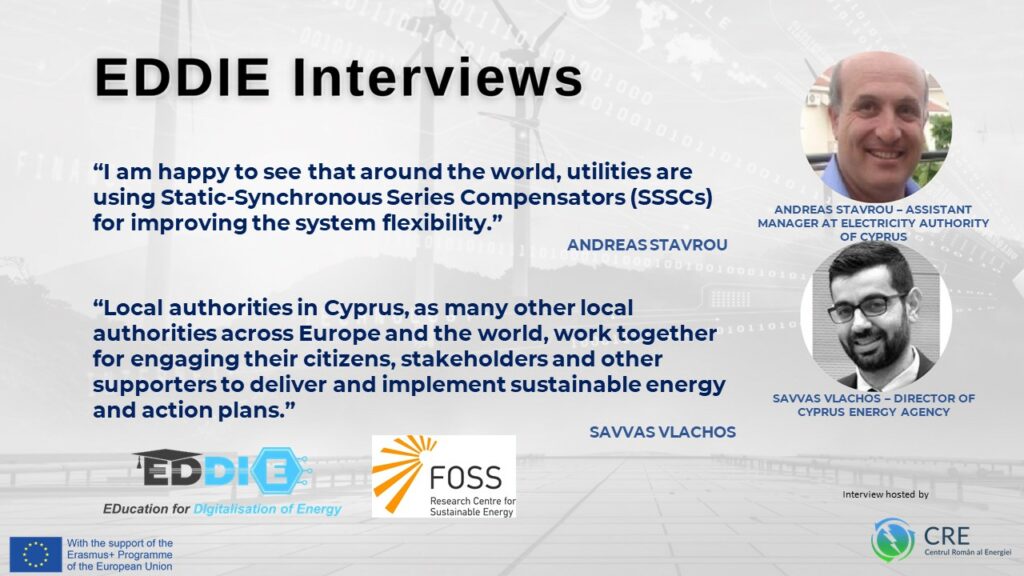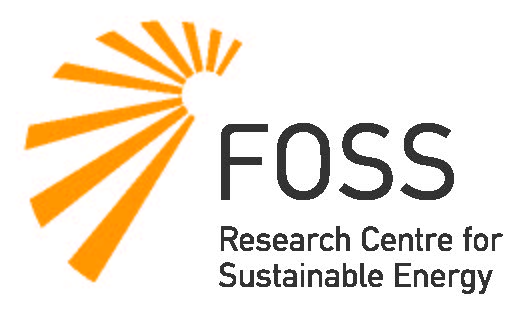4th guest – Partner FOSS, Research Centre for Sustainable Energy – University of Cyprus
Andreas Stavrou – Assistant Manager at the Electricity Authority of Cyprus
Savvas Vlachos – Director of Cyprus Energy Agency

Mr. Stavrou, the digital and sustainable transformations in the energy sector are more and more visible, but based on your experience in the Transmission system Owner department, how do you see these initial transformations?
I would say that the transformation in the transmission substations technology has been continuous for many years now. I remember when we started to introduce remote terminal units in the ’90s, to be able to send the status of the substation components (breakers, isolators, switchers, etc) to the control center we had to connect wires from all these devices and all the relays in order to get operation and status signals. Later on, in the 2000s all this information started to be collected locally and we started to have communication networks for devices. All the information was exchanged over a network. The bad thing at that time was the fact that each manufacturer was using its own components and its own communication protocols, and now 20 years later, we know that these protocols are not supported by manufacturers anymore and we need to upgrade the entire automation system. At that time, the digitalization had already started and what do we see now is a step further, all the sensors are giving the measurement information to the so-called merging units that get the information from the sensors, they convert it to digital information, and they broadcasted it to the network for all the devices to get them if they needed. A positive improvement I would say since then is that all manufacturers now use the IEC 61850 communication protocol. It is possible to use devices of different manufacturers on the same network. This is a great step towards digital substations.
Regarding the sustainable transformation part of your question – I think the big change that is emerging, in relation to the transmission system, is the use of reactive power compensation. Instead of traditionally expanding and reinforcing the transmission system – we all know the spreading of transmission lines on people lands with many objections from the communities and activists, we should use power electronic compensators to smartly reroute the power in the system.
I am happy to see that around the world, utilities are using SSSCs (Static-Synchronous Series Compensators), nowadays they are even offered in modular form, for improving the system flexibility.
Mr. Stavrou, considering your previous answer, can you also tell us what new abilities or knowledge the personnel of this specific area need to acquir?
People who work in the transmission system needed and still need to understand the operation of the power system and I would say each of the devices too. People who parametrize protection devices need to understand the whole behaviour of the system in detail. Planners need to understand all the component’s characteristics, including the new ones: Renewable Energy Sources, power electronic converters, storage facilities, etc.
In addition to these, we need information technology expertise – people trained to set up all these networks, parametrize them, do trouble shooting, servicing them, etc.
The approach is to train our power system, protection engineers, technicians, in the new digital technology, to continuously engage them with ICT, digital systems and data analytics. We need to hire new experts with specialisations related to these new technologies that emerge with power systems. Also, universities must adapt their teaching programs to the industry needs
Mr. Vlachos, as the sustainable energy needs local solutions, besides European objectives, what have to do the local authorities in the sustainable energy planning process?
What are you doing when you are not working?
Mr. Stavrou:: I was born and lived on Cyprus island, on the Mediterranean, so I love the sea, and everything related to it: walking by, swimming in, enjoying sunrises and sunsets. Living close to the sea is great.
In my spare time I like reading and recently I have been interested in neuroscience, in discovering the way in which our mind works.
Mr. Vlachos: As I am living on the same island, Cyprus, I also enjoy being outside and spending time in the nature, not only on the coastal areas, but also on the mountains area, because both have their unique experiences.




